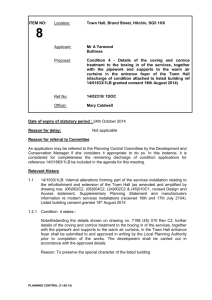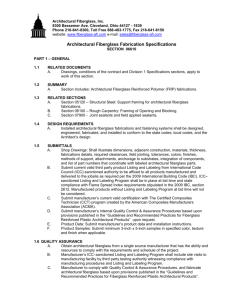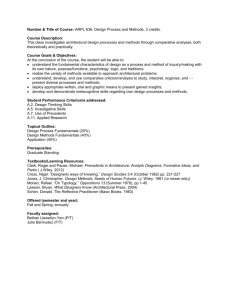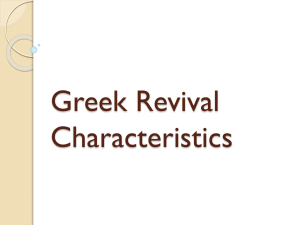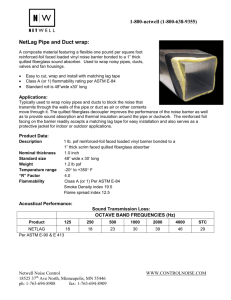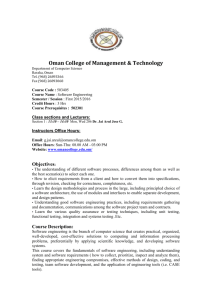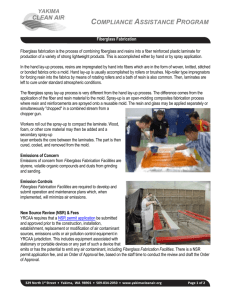Fiberglass Cornice Specifications
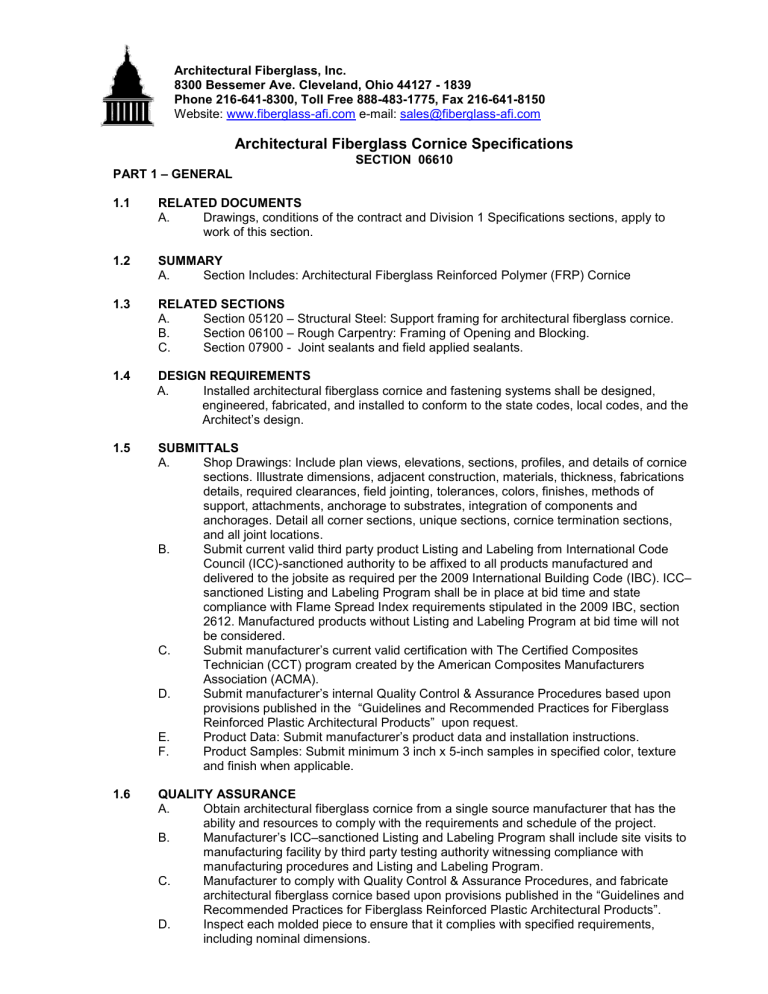
Architectural Fiberglass, Inc.
8300 Bessemer Ave. Cleveland, Ohio 44127 - 1839
Phone 216-641-8300, Toll Free 888-483-1775, Fax 216-641-8150
Website: www.fiberglass-afi.com
e-mail: sales@fiberglass-afi.com
Architectural Fiberglass Cornice Specifications
SECTION 06610
PART 1 – GENERAL
1.1 RELATED DOCUMENTS
A. Drawings, conditions of the contract and Division 1 Specifications sections, apply to work of this section.
1.2 SUMMARY
A. Section Includes: Architectural Fiberglass Reinforced Polymer (FRP) Cornice
1.3 RELATED SECTIONS
A.
B.
Section 05120 – Structural Steel: Support framing for architectural fiberglass cornice.
Section 06100 – Rough Carpentry: Framing of Opening and Blocking.
C. Section 07900 - Joint sealants and field applied sealants.
1.4 DESIGN REQUIREMENTS
A. Installed architectural fiberglass cornice and fastening systems shall be designed, engineered, fabricated, and installed to conform to the state codes, local codes, and the
Arc hitect’s design.
1.5 SUBMITTALS
A. Shop Drawings: Include plan views, elevations, sections, profiles, and details of cornice sections. Illustrate dimensions, adjacent construction, materials, thickness, fabrications details, required clearances, field jointing, tolerances, colors, finishes, methods of
B. support, attachments, anchorage to substrates, integration of components and anchorages. Detail all corner sections, unique sections, cornice termination sections, and all joint locations.
Submit current valid third party product Listing and Labeling from International Code
Council (ICC)-sanctioned authority to be affixed to all products manufactured and delivered to the jobsite as required per the 2009 International Building Code (IBC). ICC – sanctioned Listing and Labeling Program shall be in place at bid time and state
C.
D.
E.
F. compliance with Flame Spread Index requirements stipulated in the 2009 IBC, section
2612. Manufactured products without Listing and Labeling Program at bid time will not be considered.
Submit manufactu rer’s current valid certification with The Certified Composites
Technician (CCT) program created by the American Composites Manufacturers
Association (ACMA).
Submit manufacturer’s internal Quality Control & Assurance Procedures based upon provisions publis hed in the “Guidelines and Recommended Practices for Fiberglass
Reinforced Plastic Architectural Products” upon request.
Product Data: Submit manufacturer’s product data and installation instructions.
Product Samples: Submit minimum 3 inch x 5-inch samples in specified color, texture and finish when applicable.
1.6 QUALITY ASSURANCE
A. Obtain architectural fiberglass cornice from a single source manufacturer that has the
B. ability and resources to comply with the requirements and schedule of the project.
Manufact urer’s ICC–sanctioned Listing and Labeling Program shall include site visits to
C.
D. manufacturing facility by third party testing authority witnessing compliance with manufacturing procedures and Listing and Labeling Program.
Manufacturer to comply with Quality Control & Assurance Procedures, and fabricate architectural fiberglass cornice based upon provisions published in the “Guidelines and
Recommended Practices for Fiberglass Reinforced Plastic Architectural Products”.
Inspect each molded piece to ensure that it complies with specified requirements, including nominal dimensions.
1.7
1.8 DELIVERY, STORAGE AND HANDLING
A. Handle, store and transport architectural fiberglass cornice according to manufacturer’s recommendations and in a manner that prevents damage.
B.
C.
Protect architectural fiberglass cornice from damage by retaining shipping protection in place until installation.
Damage Responsibility: Except for damage caused by others, the installer is responsible
1.9 WARRANTY
A. Warrant architectural fiberglass cornice to be free from defect due to materials and workmanship for one year.
PART 2 – PRODUCTS
2.1 ACCEPTABLE MANUFACTURER
Architectural Fiberglass, Inc.
8300 Bessemer Ave, Cleveland, Ohio 44127
1-888-483-1775, 216-641-8300, 216-641-8150 Fax
2.2 for chipping, cracking, or other damage to fiberglass cornice, after delivery to the jobsite and until installation is completed and inspected and approved by the Architect or owner’s representative.
FABRICATION PATTERNS/MOLDS
A.
B.
C.
Custom Architectural Fiberglass Cornice.
Custom Pattern/Mockups: Patterns and mockups shall be hand carved and/or CNC machined by skilled pattern makers with minimum of ten (10) years experience with architectural elements. Patterns & mockups shall be available at manufacturing facility for architect’s inspection and approval before molds are produced.
Custom Molds: Molds shall be produced with ample layers of tooling resin, tooling gelcoat, glass fibers and/or flexible rubber by skilled mold makers with minimum of ten (10) years experience with architectural elements. Produced molds shall have rigidity and thickness to prevent distortion and deflection of molded architectural fiberglass.
D.
E.
F.
Cornice sections shall be manufactured with sealable lap and/or butt joints. Cornice joints shall be manufactured to accommodate adjoining sections and alignment of cornice surface sections.
Factory inside and outside corners, and unique transition sections shall be shop fabricated. Field corner fabrication will not be permitted.
Coordinate miscellaneous cutouts required for vents, drainage, and other cornice obstructions/penetrations
2.3
MANUFACTURER’S QUALIFICATIONS
A. Manufacturer: Provide products manufactured by a firm specializing in the manufacture
B. of fiberglass cornice, in the United States with a minimum of ten (10) years experience.
All products manufactured shall carry ICC –sanctioned Listing and Labeling per 2009
IBC.
C.
D.
E.
Manufacturer shall demonstrate current valid certification and participation in the CCT program and fabricate material based upon provisions publ ished in the “Guidelines and
Recommended Practices for Fiberglass Reinforced Plastic Architectural Products”.
Provide a list of projects comparable in size, scope, and complexity as indicated, upon request.
Provide verification that fiberglass cornice meets or exceeds products specified.
MATERIALS CHARACTERISTICS
A. MOLDED EXTERIOR SURFACE: U-V inhibited, NPG-ISO polyester gel coat, 18 to 22
B. mils thick. Color to match in texture and finish of sample supplied by Architect.
BARRIER COAT: Specifically formulated backup polyester surface veil 18-20 mils thick
C. to prevent glass print through and ultimate Class A finish.
BACK UP LAMINATE:
1. Resin: Polyester resin shall be fire retardant, and meet Class 1 flame spread rating of 25 or less and smoke density under 450 without the use of antimony
2.
3.
4. trioxide as characterized by the ASTM E84 tunnel test at typical 1/8” glass mat laminate. General Purpose resin will not be permitted.
Filler: Functional filler to be added to resin matrix to minimize shrinkage, add stiffness, control opacity, add fire retardance, improve surface finish, minimize crazing, and control dimensional stability from weather extremes.
Fiberglass Reinforcement: Type “E” fiberglass, glass cloth, matt and/or random chopped glass fibers. Glass content approximately 20% to 30%.
Laminate Thickness: Nominal laminate shall be minimum 3/16” thickness.
Additional core reinforcements and/or sandwich structure shall be added as required for rigidity and structural integrity. Fiberglass laminate thickness to meet the structural design as indicated on the drawings. Additional stiffeners and framing as required shall be embedded in the fiberglass composite to ensure straightness, strength, and profile dimensional stability. Additional skeleton framing will not be field provided. Flat surfaces equal to or greater than
12" by 12" or any running surface equal to or greater than 9" in width, shall be fabricated with a minimum 1/4" thick sandwich core structure.
2.4 AVERAGE MECHANICAL PROPERTIES:
PROPERTY VALUE
Tensile strength
Flexural strength
Flexural modulus
Compressive strength
Bearing strength
Thermal expansion
Specific gravity
12,000 PSI
20,000 PSI
0.9 x 10 6 PSI
17,000 PSI
9,000 PSI
10 x 10 -6 (
F)
1.5
TEST METHOD
ASTM D638
ASTM D790
ASTM D790
ASTM D695
ASTM D638
2.5 FINISH
A. Color as sel ected by Architect or Owner’s representative.
B. Surface Texture/Exposed side shall be smooth or textured based upon approved sample.
2.6 TOLERANCES
A.
B.
C.
Part Thickness: + or – 1/8 inch.
Gel Coat Thickness: + or – 2.5 mils.
Length: + or – 1/8 inch
D.
E.
Variation from Square: 1/8 inch.
Hardware Location Variation: + or – ¼ inch.
2.7 IDENTIFICATION
A. Identify each architectural fiberglass cornice unit with a permanent serial number.
B. Number cornice parts to coordinate with shop drawings.
2.8 CURING AND CLEANING
A. Cure and clean components prior to shipment and remove material which may be:
1. Toxic to plant or animal life.
2. Incompatible with adjacent building material.
2.9 of architectural fiberglass cornice as recommended and approved by fiberglass fabrication manufacturer.
PART 3 – EXECUTION
3.1
ANCHORS AND FASTENERS
A. Contractor to provide anchors and fasteners and other accessories for proper installation
PRE-INSTALLATION EXAMINATION
A. Carefully observe and verify field conditions that substrates are ready for installation of architectural fiberglass cornice. Contractor shall verify on site dimensions with shop
B. drawings and assume full responsibility for fitting the components to the structure.
Verify that bearing surfaces are true and level.
3.2
3.3
3.4
3.5
C.
D.
E.
F.
Verify that support framing has been constructed to allow accurate placement, alignment and connection of architectural fiberglass cornice to structure.
Report discrepancies between design dimensions and field dimensions, which could adversely affect cornice installation, to the Architect and/or Owner’s Representative.
Do not proceed with installation until discrepancies are corrected, or until installation requirements are modified and approved by the Architect and / or Owner’s
Representative.
Beginning of installation means acceptance of existing conditions and fiberglass materials.
INSTALLATION
A. Install architectural fiberglass cornice in accordance with manufacturer’s instructions and
B. approved shop drawings.
Erect required connection blocking, framing, and cornice, plumb, square, and true to line and level to substrate. Recess blocking or notch continuous blocking behind each panel joint per manufacturer’s instructions. The installer shall supply connectors, blocking and
C. framing approved by cornice manufacturer.
Space joints according to shop drawings, not less than 1/8” and not greater than 3/8”.
Prepare joints by lightly sanding and filling joints with a continuous bead of specified
D.
E. sealant as work progresses to make a weather tight joint. Carefully monitor ambient temperatures at time of installation to prevent excessive expansion and contraction of panels during sealant application.
Do not field cut cornice where the finish cannot be field restored. Installer may repair small unnoticeable finish repairs with manufacturer’s supplied colored gel-coat patching material.
Countersink all exposed fasteners and repair with manufacturer’s supplied colored gelcoat patching material. Repairs shall be made with care to be undetectable.
ALLOWABLE TOLERANCES FOR INSTALLED UNITS
A. Maximum offset from True Alignment: 1/4 inch in 20 feet.
B. Maximum Variation from True Position: 1/2 inch in 20 feet.
CLEANING
A. Clean installed architectural fiberglass cornice using cleaning methods and material approved by manufacturer.
PROTECTION OF INSTALLED FABRICATIONS
A. Comply with manufacturer’s recommendations and instructions for protecting installed cornice during construction activities.
ARCHITECTURAL FIBERGLASS
END OF SECTION
